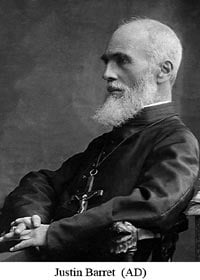Born in Labets-Biscay (Basses-Pyrénées), September 1, 1826
Taking of the habit at N.-D. de l’Osier, December 7, 1849
Oblation at N.-D. de l’Osier, December 8, 1850 (No.297)
Ordination to priesthood in Marseilles, April 3, 1853
Died in Durban, January 11, 1911.
Justin Barret was born on September 1, 1826,in Labets-Biscay, in the diocese of Bayonne, France. He spent eight years at the Collège de Saint-Palais for his secondary education and studies in corn-mercer a profession that his family wanted him to adopt. At 18 years of age he discerned that he was called to the priesthood and entered the major seminary in 1844. During his seminary days he discovered his vocation to be a missionary and this led him to enter the novitiate of the Oblates of Mary Immaculate at Notre-Dame de 1’Osier on December 8, 1849. He made his perpetual oblation one year later and was then sent to Marseilles to complete his scholasticate formation. Here he was ordained to the priesthood on March 25, 1853. Shortly after he received his obedience for Natal in Southern Africa.
Accompanied by scholastic Joseph Gérard, then a deacon, and beatified in 1988, and Brother Pierre Bernard, Father Justin Barret left from Toulon in May 1853; after several months on the island of Mauritius, he and his companions finally arrived in Pietermaritzburg in January 1854.
The next few months were spent in learning English as a necessary means of acquiring a knowledge of the native language; at the same time preparations were being made for the founding of the first Zulu mission: it was to be dedicated to St. Michael.
Fathers Gérard and Barret walked to Chief Dumisa’s Kraal – a distance of some 90 miles – a first time to explore the site and again, a few months later, to begin the St. Michael’s mission. Bishop Jean-François Allard resided in Pietermaritzburg from 1852-1857 and made several trips to St. Michael’s.
After two years, this mission was closed and Father Barret took charge of the parish of Pietermaritzburg: here he was to remain for over fifty years. During Bishop Allard’s frequent absences due to visits to the missions in Natal and Basutoland (Lesotho today), Father Barret had the responsibility and care of the Natal Vicariate in addition to his parochial duties. In 1865 he himself visited Zululand as well as Greytown, Estcourt and Newcastle.
Over the years he made several improvements and additions to the first church of St. Mary’s originally built by the Bishop in 1852. As new Oblate missionaries arrived, they spent brief periods under the guidance of Father Barret and in this way his Oblate life had an influence in the widespread mission field. He was described as being an eloquent preacher, nervous on occasion, but his character and judgment were sound. The financial affairs of the Bishop were in his hands and far-reaching decisions had to be made.
The first steps in the way of education were taken by him and at the outset he taught in the classroom. Writing to Bishop de Mazenod he complained about this situation, stating that he had come to Natal for missionary work among the Zulu people. Despite these initial ambitions, he continued faithfully in his parochial duties and various works of the ministry for over half a century. Along with his first companion, Father Joseph Gérard, he is one of the last links with the pioneer days and continued in this tradition under Bishops Charles Jolivet and Henri Delalle.
His first labours among the Zulus gave him a very disheartening attitude towards this particular work and this made Bishop Allard change his sphere of work to Pietermaritzburg and to teaching. There was at one time even the possibility of Father Barret returning to Europe like his former companions. Fathers Laurent Dunne and Julien Maurice Logegaray.
Because of ill health, Father Barret was transferred to Durban in June 1906. He died there on January 11, 1911.
John E. Brady, O.M.I.

